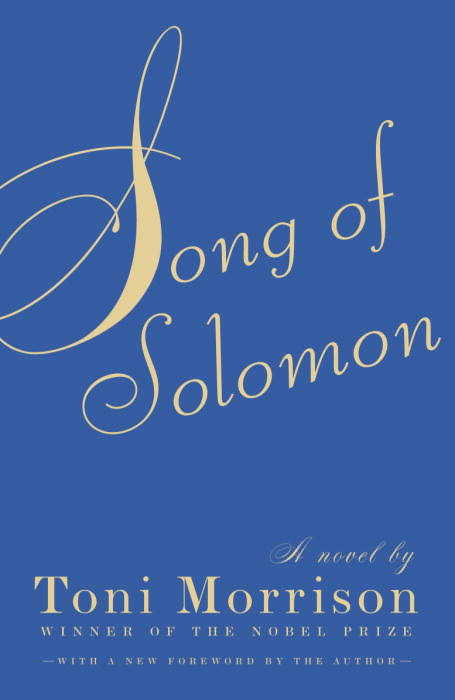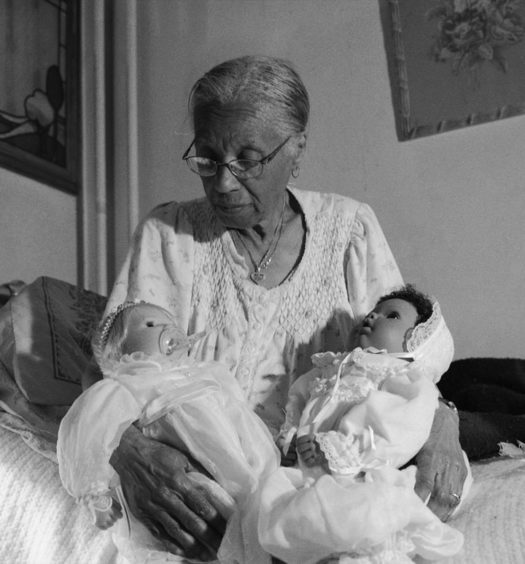By Toni Morrison
Excerpt from book:
“Your wine any good, Pilate?” asked Guitar.
“Couldn’t tell you.”
“Why not?”
“Never tasted it.”
Milkman laughed. “You sell wine you don’t even taste?”
“Folks don’t buy it for the taste. Buy it to get drunk.”
Reba nodded. “Used to anyway. Ain’t buying nothing now.”
“Don’t nobody want no cheap home brew. The Depression’s over,” Hagar said. “Everybody got work now. They can afford to buy Four Roses.”
“Plenty still buy,” Pilate told her.
“Where you get the sugar for it?” Guitar asked.
“Black market,” said Reba.
“What ‘plenty’? Tell the truth, Mama. If Reba hadn’t won that hundred pounds of groceries, we’d have starved last winter.”
“Would not.” Pilate put a fresh piece of twig in her mouth.
“We would have.”
“Hagar, don’t contradict your mama,” Reba whispered.
“Who was gonna feed us?” Hagar was insistent. “Mama can go for months without food. Like a lizard.”
“Lizard live that long without food?” asked Reba.
“Girl, ain’t nobody gonna let you starve. You ever had a hungry day?” Pilate asked her granddaughter.
“Course she ain’t,” said her mother.
Hagar tossed a branch to the heap on the floor and rubbed her fingers. The tips were colored a deep red. “Some of my days were hungry ones.”
With the quickness of birds, the head of Pilate and Reba shot up. They peered at Hagar, then exchanged looks.
“Baby?” Reba’s voice was soft. “You been hungry, baby? Why didn’t you say so?” Reba looked hurt. “We get you anything you want, baby. Anything. You been knowing that.”
Pilate spit her twig into the palm of her hand. Her face went still. Without those moving lips her face was like a mask. It seemed to Milkman that somebody had just clicked off a light. He looked at the faces of the women. Reba’s had crumpled. Tears were streaming down her cheeks. Pilate’s face was still as death, but alert as though waiting for some signal. Hagar’s profile was hidden by her hair. She leaned forward, her elbows on her thighs, rubbing fingers that looked bloodstained in the lessening light. Her nails were very very long.
The quiet held. Even Guitar didn’t dare break it.
Then Pilate spoke. “Reba. She don’t mean food.”
Realization swept slowly across Reba’s face, but she didn’t answer. Pilate began to hum as she returned to plucking the berries. After a moment, Reba joined her, and they hummed together in perfect harmony until Pilate took the lead:
O Sugarman don’t leave me here
Cotton balls to choke me
O Sugarman don’t leave me here
Buckra’s arms to yoke me…
When the two women got to the chorus, Hagar raised her head and sang too.
Sugarman done fly away
Sugarman done gone
Sugarman cut across the sky
Sugarman gone home.
Milkman could hardly breathe. Hagar’s voice scooped up what little pieces of heart he had left to call his own. When he thought he was going to faint form the weight of what he was feeling, he risked a glance at his friend and saw the setting sun gilding Guitar’s eyes, putting into shadow a slow smile of recognition (pages 48-49).”
“The people turned around. Reba had entered and was singing too. Pilate neither acknowledged her entrance nor missed a beat. She simply repeated the word “Mercy,” and Reba replied. The daughter standing at the back of the chapel, the mother up front, they sang.
In the nighttime.
Mercy.
In the darkness.
Mercy.
In the morning.
Mercy.
At my bedside.
Mercy.
On my knees now.
Mercy. Mercy. Mercy. Mercy.
They stopped at the same time in a high silence. Pilate reached out her hand and placed three fingers on the edge of the coffin. Now she addressed her words to the woman bordered in gray satin who lay before her. Softly, privately, she sang to Hagar the very same reassurance she had promised her when she was a little girl.
Who’s been botherin my sweet sugar lumpkin?
Who’s been botherin my baby?
Who’s been botherin my sweet sugar lumpkin?
Who’s been botherin my baby girl?
Somebody’s been botherin my sweet sugar lumpkin.
Somebody’s been botherin my baby.
Somebody’s been botherin my sweet sugar lumpkin.
Somebody’s been botherin my baby girl.
I’ll find who’s botherin my sweet sugar lumpkin.
I’ll find who’s botherin my baby.
I’ll find who’s botherin my sweet sugar lumpkin.
I’ll find who’s botherin my baby girl.
“My baby girl.” The three words were still pumping in her throat as she turned away from the coffin. Looking about at the faces of the people seated in the pews, she fastened on the first pair of eyes that were directed toward her. She nodded at the face and said, “My baby girl.” She looked for another pair of eyes and told him also, “My baby girl.” Moving back down the aisle, she told each face turned toward her the same piece of news. “My baby girl. That’s my baby girl. My baby girl. My baby girl. My baby girl (pages 317-318).”




